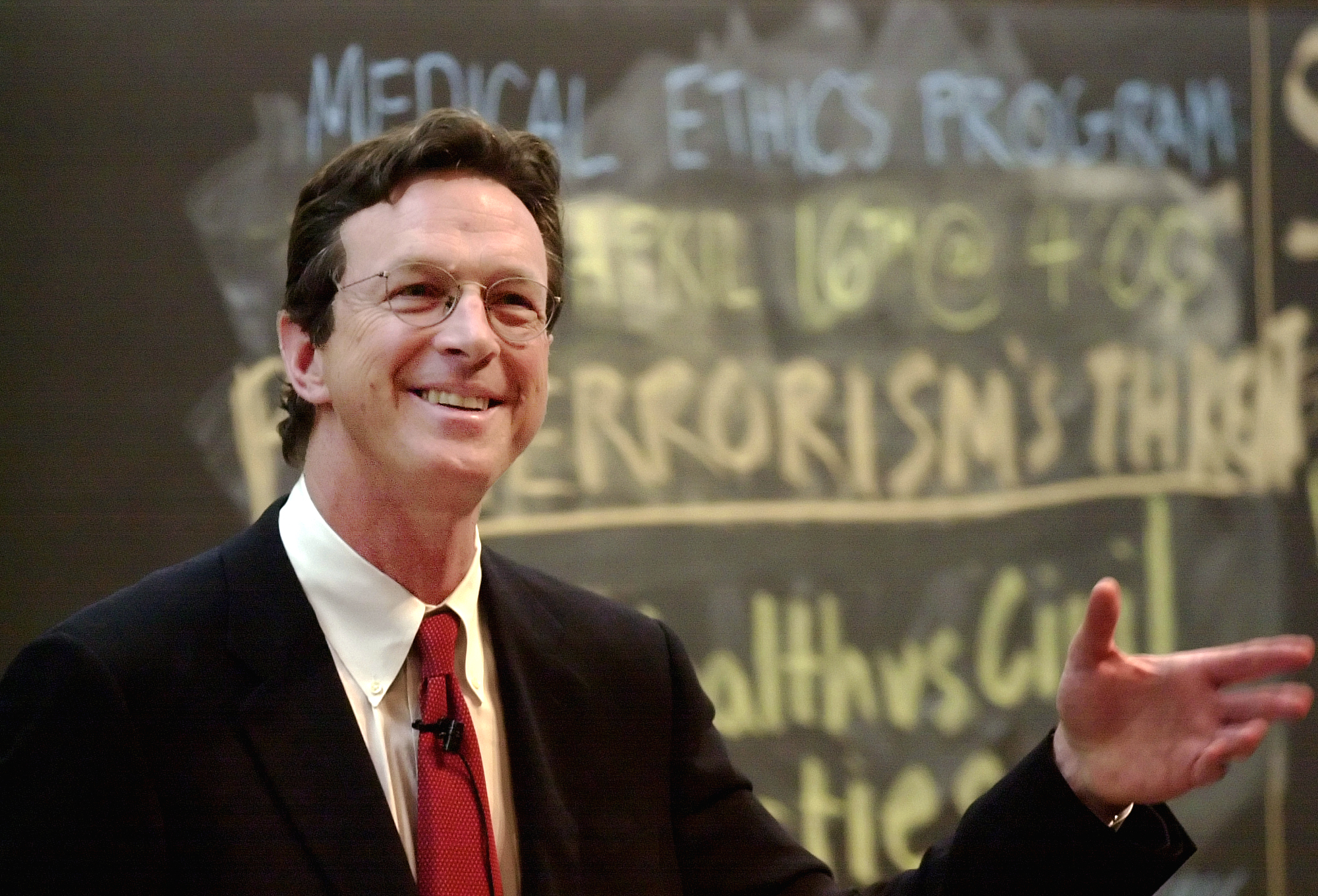Welt in Angst. München 2005. ISBN 3-89667-210-X. Nachwort. S. 526. Übersetzer: Ulnke Wasel und Klaus Timmermann
Original englisch: "The past history of human belief is a cautionary tale. We have killed thousands of our fellow human beings because we believed they had signed a contract with the devil, and had become witches. We still kill more than a thousand people a year for witchcraft." - State of Fear. HarperCollins 2004. p. 580
Werk

Welt in Angst
Michael CrichtonMichael Crichton Berühmte Zitate
Welt in Angst. München 2005. ISBN 3-89667-210-X. Nachwort. S. 515. Übersetzer: Ulnke Wasel und Klaus Timmermann
Original englisch: "There are many reasons to shift away from fossil fuels, and we will do so in the next century without legislation, financial incentives, carbon-conservation programs, or the interminable yammering of fearmongers. So far as I know, nobody had to ban horse transport in the early twentieth century." - State of Fear. HarperCollins 2004. p. 570
Welt in Angst. München 2005. ISBN 3-89667-210-X. Nachwort. S. 516. Übersetzer: Ulnke Wasel und Klaus Timmermann
Original englisch: "The “precautionary principle,” properly applied, forbids the precautionary principle. It is self-contradictory. The precautionary principle therefore cannot be spoken of in terms that are too harsh." - State of Fear. HarperCollins 2004. p. 571
„Ich weiß mit Gewissheit, dass es zu viel Gewissheit in der Welt gibt.“
Welt in Angst. München 2005. ISBN 3-89667-210-X. Nachwort. S. 518. Übersetzer: Ulnke Wasel und Klaus Timmermann
Original englisch: "I am certain there is too much certainty in the world." - State of Fear. HarperCollins 2004. p. 573
Welt in Angst. München 2005. ISBN 3-89667-210-X. Nachwort. S. 514. Übersetzer: Ulnke Wasel und Klaus Timmermann
"We know astonishingly little about every aspect of the environment, from its past history, to its present state, to how to conserve and protect it. In every debate, all sides overstate the extent of existing knowledge and its degree of certainty." - State of Fear
Michael Crichton: Zitate auf Englisch
“Nobody is driven by abstractions like 'seeking truth.”
Quelle: Jurassic Park
“The planet has survived everything, in its time. It will certainly survive us.”
Quelle: Jurassic Park
“Discovery is always rape of the natural world. Always.”
Quelle: Jurassic Park
“All major changes are like death. You can't see to the other side until you are there.”
Quelle: Jurassic Park
“You know, at times like this one feels, well, perhaps extinct animals should be left extinct.”
Quelle: Jurassic Park
“He prays because he knows he doesn't control it. He's at the mercy of it.”
Quelle: Jurassic Park
“Increasingly, the mathematics will demand the courage to face its implications.”
Quelle: Jurassic Park
Variante: Professor Johnston often said that if you didn't know history, you didn't know anything. You were a leaf that didn't know it was part of a tree.
Quelle: Timeline
“I am certain there is too much certainty in the world.”
State of Fear (2004)
“Do you know what we call opinion in the absence of evidence? We call it prejudice.”
Quelle: State of Fear
Environmentalism as a Religion (2003)
Kontext: Environmentalism needs to be absolutely based in objective and verifiable science, it needs to be rational, and it needs to be flexible. And it needs to be apolitical. To mix environmental concerns with the frantic fantasies that people have about one political party or another is to miss the cold truth — that there is very little difference between the parties, except a difference in pandering rhetoric. The effort to promote effective legislation for the environment is not helped by thinking that the Democrats will save us and the Republicans won't. Political history is more complicated than that.
“I want to mention in passing that punditry has undergone a subtle change over the years.”
"Why Speculate?" https://web.archive.org/web/20050328084634/http://www.crichton-official.com/speeches/speeches_quote03.html - speech at the International Leadership Forum, La Jolla, California (26 April 2002)
Kontext: I want to mention in passing that punditry has undergone a subtle change over the years. In the old days, commentators such as Eric Sevareid spent most of their time putting events in a context, giving a point of view about what had already happened. Telling what they thought was important or irrelevant in the events that had already taken place. This is of course a legitimate function of expertise in every area of human knowledge.
But over the years the punditic thrust has shifted away from discussing what has happened, to discussing what may happen. And here the pundits have no benefit of expertise at all. Worse, they may, like the Sunday politicians, attempt to advance one or another agenda by predicting its imminent arrival or demise. This is politicking, not predicting.
Environmentalism as a Religion (2003)
Kontext: The notion that the natural world obeys its own rules and doesn't give a damn about your expectations comes as a massive shock... it will demand that you adapt to it — and if you don't, you die. It is a harsh, powerful, and unforgiving world, that most urban westerners have never experienced.
